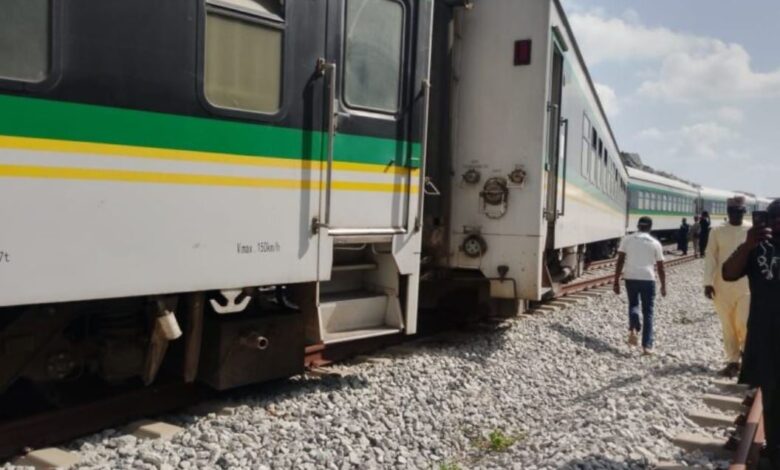
The Nigerian Safety Investigation Bureau (NSIB) has commenced an investigation into a train derailment that occurred Sunday, May 26, 2024, at Jere Station, involving the passenger train KA2/loco 2702 en route to Idu Station, Abuja from Rigasa Station, Kaduna.
Director, Public Affairs and Consumer Protection of the bureau
Mrs Bimbo Olawumi Oladeji who made this known in a statement on Monday noted that no passengers or crew members were injured.
According to the statement, the train departed Rigasa at 8:00 AM local time with 685 passengers and crew onboard and approached Jere station at approximately 9:28 AM.
It explained that while navigating a switch point north of Jere Station, the baggage van (BVA) and one passenger coach derailed and the derailed coaches were dragged approximately 86 feet from the switchpoint before coming to a stop.
Crew members onboard included two drivers: one at the front and one at the rear locomotive, two train guards, three travelling ticket collectors (TTC), 20 police escorts (two at each coach), and four bomb disposal unit members.
The train consisted of 10 coaches, one baggage van (BVA), and two locomotives (one at the front and one at the rear).
Following the incident, all passengers safely disembarked and were transported with the rear locomotive and the remaining eight coaches to Abuja, where they arrived at 12:32 PM, behind the scheduled arrival time of 10:17 AM.
The front locomotive, the derailed BVA, the derailed coach, and another unaffected coach remained at the site of the incident.
The NSIB further disclosed that preliminary fact-finding undertaken by its Investigators revealed that the train was travelling at a speed of 90 km/h in the section leading up to Jere Station and reduced to 23 km/h on approach to the station.
However, immediately after the Northern change point at Jere Station, the BVA and a coach of the train derailed.
The NSIB said its investigation seeks to determine the circumstances that led to the derailment.
The investigation, it stated will examine factors such as the train’s speed, track conditions, mechanical components, and operational procedures.
As part of the investigation process, the NSIB will collaborate with relevant stakeholders, including the Nigerian Railway Corporation (NRC), to analyse data from the On-Train Monitoring Recorder (OTMR) and other critical sources of information.
“The safety of passengers and crew is paramount, and NSIB is committed to ensuring that all necessary measures are taken to prevent reoccurrence and improve the safety of our railway systems,” stated Captain Alex Badeh Jr., Director General of NSIB.
“Our priority is to determine the derailment’s root cause(s) and make safety recommendations to enhance the safety of railway operations in Nigeria and prevent reoccurrence”.
The Bureau said it is committed to conducting a comprehensive and transparent investigation, adhering to international standards and best practices. Updates will be provided as the investigation progresses.
The NSIB urged the public to exercise patience and refrain from speculating on the causes of the derailment until the investigation is concluded and factual findings are presented.







